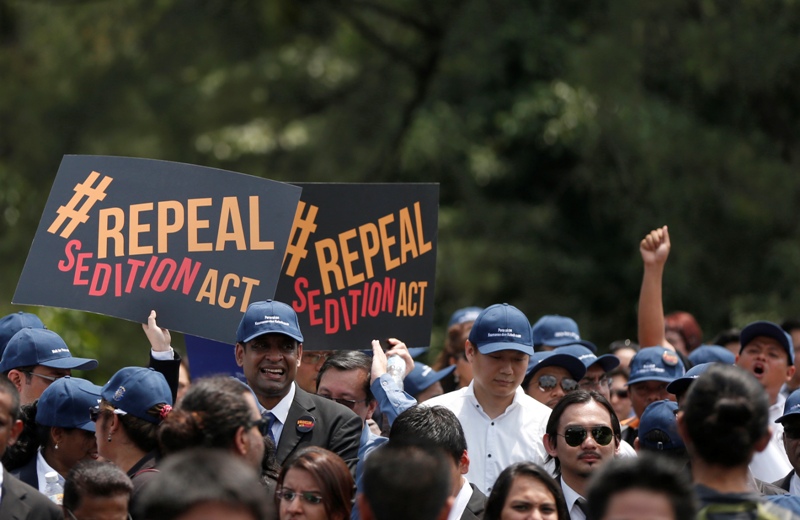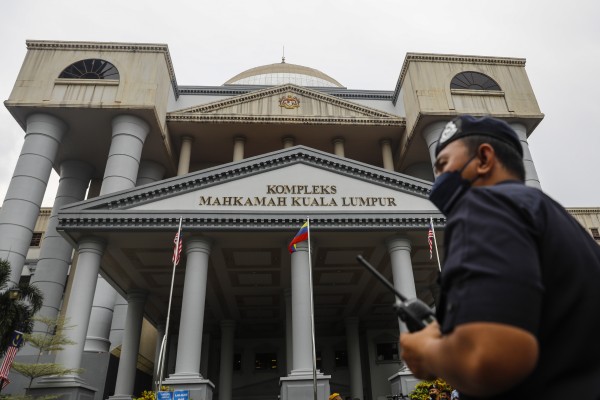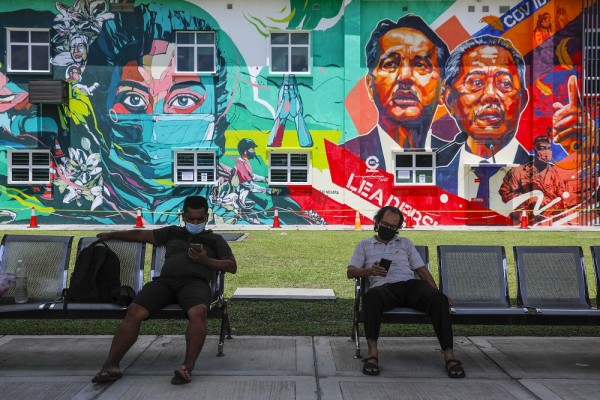Malaysia should repeal its colonial-era Sedition Act, the International Press Institute (IPI) said today amid a wave of criminal sedition cases against journalists and commentators that observers say are intended to intimidate critical voices into silence.
Most recently, a Kuala Lumpur court on Friday charged a well-known political cartoonist with nine separate counts of sedition, defined under 1948 legislation as inciting hatred or contempt against the government or sowing enmity among social groups. The cartoonist, Zulkiflee Anwar Ulhaque, faces up to 43 years in prison, according to his lawyer, over a series of tweets in February criticising the prosecution of Malaysian opposition leader Anwar Ibrahim on sodomy charges.
Last Monday, three Malaysia Insider editors, Lionel Morais, Amin Iskandar, and Zulkifli Sulong, were arrested under the Sedition Act over a Mar. 25 story suggesting that Malaysia’s Confederation of Rulers had vetoed a proposal allowing the use of a form of Islamic punishment, hudud, in Kelantan state. Police and officials from the Malaysian Communications and Multimedia Commission raided Malaysian Insider offices and confiscated computers and other items found during their search.
The following day, Ho Kay Tat, CEO and publisher of The Edge media group, which owns Malaysia Insider, and Jahabar Sadiq, CEO and editor of the paper, were arrested when they attempted to give statements on behalf on their detained colleagues.
All five men were released on bail by Wednesday but IPI Director of Press Freedom Programmes Scott Griffen said IPI remained deeply concerned about abuse of the Sedition Act to harass members of the media. “As this week’s events unfortunately show, the Sedition Act, despite its antiquated nature, remains a convenient tool for those in power to suppress unwanted and uncomfortable speech,” Griffen said. “Journalistic work – including critical reporting on matters of public interest – simply does not amount to treason. We urge the Malaysian government to follow through on its previous promise to repeal the Sedition Act without delay.”
Malaysian Prime Minister Najib Rizak had vowed to revoke the Sedition Act after a series of protests in 2012 but reneged on his pledge in 2014, promising to instead make the law stronger by adding a special clause criminalising criticism of religions.
The Act made international headlines last month after Nurul Izzah Anwar, an MP and the daughter of Anwar Ibrahim, was arrested on Mar. 16 for sedition a week after delivering a speech to parliament criticising her father’s jailing (Ibrahim began serving a five-month prison sentence in February). She was later released, but her detention remains one among many. Other recent high profile arrests under the Sedition Act include those of human rights lawyers Eric Paulson and Michelle Yesudas on Mar. 22, activist Lawrence Jeyaraj on Feb. 20, Socialist Party of Malaysia vice-president S Arutchelvan on Feb. 19 and MP Rafizi Ramli on Mar. 27.
The string of arrests has led opposition MPs to seek the sacking of Inspector General of Police Tan Sri Khalid Abu Bakar for “alleged misuse of the Sedition Act against MPs, the detention of attendees of public assemblies and for recent social media crackdowns”.
The Centre for Independent Journalism – Malaysia (CIJ) and the Southeast Asian Press Alliance (SEAPA) said the arrests of the Malaysian Insider editors represented “an assault on media freedom and an act of intimidation” and linked it to a wave of harassment against “those critical of the government”, including the Insider. Malaysia’s National Union of Journalists (NUJ), the Institute of Journalists Malaysia (IoJ), and the Foreign Correspondents Club of Malaysia (FCCM) likewise condemned the police’s actions. Several of the groups noted that even if the Insider’s account were untrue – as the Confederation of Rulers has claimed – the arrests represented a “wholly disproportionate” response.
Separately, IPI strongly condemned death and rape threats made against a Malaysian radio journalist who had questioned the Kelantan legislature’s focus on implementing hudud. “Religion is used to distract the people from important issues like the economy and governance”, said the journalist, Aisyah Tajudin of BFM Radio, in a two-minute video clip entitled “Does hudud fill our rice bowls?”, according to a translation of her comments carried in the media. Hudud involves fixed punishments for a number of “crimes against God”, including theft (amputation of the hand) and apostasy (death or banishment).
After the video was uploaded on March 19, Tajudin was accused on social media of insulting Islam for her questioning of hudud, and became the target of vicious threats of physical violence. One user called for her to be “burned alive”; another said, “If I see you in front of me, I’ll shoot you in the head”. Tajudin was also criticised for not wearing a head scarf in the video.
Several days later, Tajudin issued an apology for her “tone and demeanour in the video” and said she would “never insult or condemn any religion, let alone my own”. The apology came shortly after editors at the newspaper Utusan Malaysia, which is owned by Malaysia’s ruling party, UMNO, collectively called on Tajudin to “repent” and said she had only herself to blame for the threats, according to reports.
“While the reaction to Ms. Tajudin’s video is extremely troubling, what is even more shocking is the lack of response – or worse – from both Kelantan and Malaysian authorities,” said Griffen. “Officials need to make it clear that violence against journalists will not be tolerated in Malaysia and should take any necessary steps to guarantee Ms. Tajudin’s safety. If Malaysia’s journalists are unable to comment on topics of obvious public interest out of fear, democracy is seriously threatened.”
Cyber-bullying of journalists due to their work is a rising problem around the world, as IPI’s digital media coordinator, Javier Luque, reported earlier this year. Women journalists were seen as particularly vulnerable, especially when covering topics traditionally the province of men.



